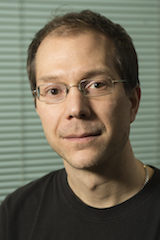New CELL Faculty Member Profile – Alexander Beristain

Dr. Beristain grew up on Vancouver Island and completed his PhD at UBC in the Reproductive and Developmental Sciences graduate program. His research interests in development and stem cell biology led him to the University of Toronto to postdoc in Rama Khokha’s lab, after which he moved back to UBC in 2012 to start his independent lab. His current research focus is on placental development, which a specific interest in human trophoblast stem cell biology and trophoblast differentiation. He loves the outdoors, especially ski touring and hiking in the mountains. He tries to keep fit playing squash and compensate this through his like of tasty local craft beers.
More information about the Beristain lab:
The human placenta is unique among eutherian mammals. One of the most striking distinctions in humans is the ability of specialized epithelial cells of the placenta (called trophoblasts) to acquire highly-invasive characteristics similar to invasive tumor cells. Invasive trophoblast populations play critical roles in remodeling the uterine microenvironment and facilitating nutrient and oxygen transfer between mother and developing baby. The success of placental formation (and pregnancy) is ultimately dictated by tight regulatory mechanisms that both promote and restrain differentiation of trophoblast subsets into highly-invasive populations. Conditions that suppress trophoblast differentiation impair vascular remodeling and lead to inadequate inter-villous blood perfusion, maternal hypertension and fetal stress.
 A major focus of Beristain lab investigates both the cellular and molecular processes that direct trophoblast cell biology in early placental development. Utilizing state of the art cell isolating techniques and three-dimensional culture systems, the lab investigates:
A major focus of Beristain lab investigates both the cellular and molecular processes that direct trophoblast cell biology in early placental development. Utilizing state of the art cell isolating techniques and three-dimensional culture systems, the lab investigates:
- Trophoblast-intrinsic factors that regulate cell motility and early organ development
- Maternal derived factors (predominantly immune cells) that play underlying roles in dictating trophoblast fitness and function
- Bulk and single cell transcriptomics as platforms to understand cell differentiation gene regulatory mechanisms specific to highly-specialized invasive subsets of trophoblasts